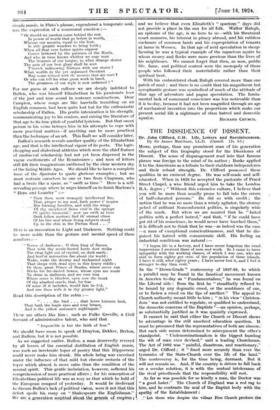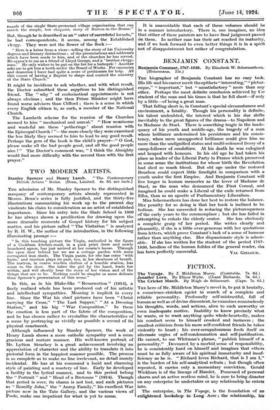THE DISSIDENCE OF DISSENT.
Dr. John Clifford, C.H. Life, Letters and Reminiscences.
• By Sir James Merchant, LL.D. (Cassell. 12s. 6d.)
MORE, perhaps, than any prominent man of his generation the subject of this biography stood for the Dissidence of Dissent. The sense of disparagement read into that famous phrase was foreign to the mind of its author ; Burke applied it to the Americans as a tribute to their stubborn independence and their robust strength. Dr. Clifford possessed these qualities in an eminent degree. He was self-made and self- educated. When in 1858 he accepted' the pastorate of Praed Street Chapel, a wise friend urged him to take the London B.A. degree ; "Without this extensive culture, I believe that you will be more than usually prone to fall into the errors of half-educated persons." He did so with credit ; the notion that he was no more than a windy agitator, the stormy petrel of militant Nonconformist politics, is singularly wide of the mark. But when we are assured that he "hated politics with a perfect hatred," and that, "if he could have got rid of his conscience, he would never have touched them," it is difficult not to think that he was—as indeed was the case man of exceptional conscientiousness, and that he dis-
guised his hatred with consummate skill. His feeling on industrial conditions was natural :— ." I began life in a factory, and I have never forgotten the cruel. impressions I received there of men and work. So I came to have sympathy with the working classes, of which I was one, who are said to form eighty per cent, of the population of these islands. I have it still, after eighty years ; I have never lost it, and I feel it stronger to-day than ever.'
In the " Down-Grade " controversy of 1887-89, to which a parallel may be found in the fanatical movement known in America to-day as "Fundamentalism," he was found 'on the Liberal side : from the first he "steadfastly refused to be bound by any dogmatic creed, or the semblance of one, or to fasten a creed on the lips of another." The appeal to Church authority meant little to him ; "in his view' Christen- dom' was not entitled to regulate, or qualified to understand, the domestic concerns of the Baptists "—an opinion, perhaps, as substantially justified as it was quaintly expressed.
It cannot be said that either the Church or Dissent' shows to advantage in the still unsolved education question. It must be presumed that the representatives of both are sincere: But each side seems determined to misrepresent the other's standpoint. " Undenominationalism is the biggest humbug the wit of man ever devised," said a leading Churchman.- The Act of 1892 was "painful, disastrous, and reactionary," urged. Dr. Clifford ; it " fixed more securely than ever the tyrannies of the State-Church over the life of the land." The controversy is, for the time being, dormant. But it will not remain so.' And, if the country is driven to fall back
on a secular solution, it is with the mutual intolerance of the rival priesthoods that the responsibility will rest. • - As far as was possible for so kindly a man, the Doctor was "a good hater." The Church of England was a red rag to him, and he contrasts the zeal of the Baptist body with the apathy of the Establishment : Let those who despise the village Free Church produce_the
annals of the singlei Btate-protected village organization that can match the simple, but eloquent, story of Barton-in-the-Beans."
But, though-he is deseribed as airC" eater-of sacerdotal locusts," he had correspondents, it seems, among the Established
clergy. They were not the flower of the flock :—
"Here is a letter from a vicar—telling the story of his University degrees and literary distinctions ; of the presentations and addresses which have been made to him, and of the churches he- has served. He appea's to me as a friend of Lloyd George, and a 'brother clergy. man: He only wishes to be put on the list for a bishopric ! Another asks me to got him a berth under the Board of Works. For canonries and deanenee I have had quite a score of petitioners for help. All this comes of having a Baptist to shape and control the ministry of the State Church."
It might be invidious to ask whether, and with what result,
the Doctor submitted these supplicas to his. distinguished friend. The " why " of ecclesiastical appointments is not
always obvious ; and the then Prime Minister might have found worse advisers than Clifford ;there is a sense in which every English citizen is; as such, a-member of the National Church.
The Lambeth scheme -for the reunion of• the Churches seemed to him "mechanical and unreal." "How wearisome
and wasteful are these potherings ' about reunion with the Episcopal Church ! "—the more closely they were examined the less likely they seemed to him to lead to any good result.
Perhaps the gem of the book is the child's prayer—" 0 God, please make all the bad people good,, and all the good people nice ! " The Doctor's comment was; "I think the Almighty would find more difficulty with the second than with the first prayer."











































 Previous page
Previous page